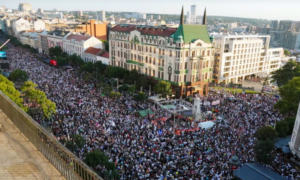Photo: The protest in Belgrade (source: REL)
On August 10, 2024, environmental associations organized a protest in Belgrade in response to the announcement of the opening of a lithium mine in the Jadar Valley. The protest was organized by environmental associations from Serbia, coinciding with the expiration of a 40-day deadline they had given to the Serbian government to pass a law permanently banning geological exploration and the exploitation of lithium and boron in Serbia.
The protest, described as the largest for environmental protection, brought around 40,000 Serbians to the streets. This protest was the last in a series of 50 gatherings that began at the end of June in Serbia, following the announcement of the lithium mine’s opening in the Jadar Valley.
Under the slogan “There will be no mining,” after hearing the speeches from the organizers, the protesters divided into two columns and marched towards the Gazela Bridge and then to the Prokop and Novi Beograd railway stations, effectively blocking the railway at two points. The Ministry of Internal Affairs of the Republic of Serbia announced that following the conclusion of the protest at Terazije, there were serious violations of public order and the law, leading to criminal charges being filed against some protesters.
Serbia’s top leaders attempted to shift the blame for organizing the protests towards the West by making unfounded claims.
Serbian Prime Minister Miloš Vučević, without providing any evidence, accused Kosovo of being involved in organizing the protest. According to him, the protest was held in the interest of Kosovo’s Prime Minister, Albin Kurti. “We will not allow you to endanger Serbia for the sake of personal interests supported by Kurti, Ustaše, and foreign services,” Vučević wrote on Twitter. This unfounded claim was also circulated by some Serbian media outlets.
Serbian President Aleksandar Vučić went even further, accusing the protesters of being part of a “hybrid” war supported by the West against the Serbian government. However, the U.S. Department of State responded, stating that any claim suggesting the United States supports anti-government protests in Serbia “is false.”
Environmental activists and mining experts in Serbia have never mentioned any involvement from Kosovo or foreign services in organizing the protest. Instead, they have emphasized the numerous problems that the opening of mines in Western Serbia would bring, such as soil pollution, contamination of groundwater, river flows, and wells. As a negative example, they pointed out the company “Rio Tinto,” which has been operating in Serbia for years.
Two of the protest organizers, Zlatko Kokanović and Nebojša Petković, spoke about the pressure they faced before the August 10th gathering. They were also interviewed by the Serbian Security and Information Agency (BIA). Although they were released, they were warned that they would face consequences for blocking the roads.
Serbian Interior Minister Ivica Dačić later announced that 14 citizens have been arrested, including some foreigners.
 Photo: The protest in Belgrade (source: REL)
Photo: The protest in Belgrade (source: REL)
Despite the protest’s stated purpose as explained by the organizers, other Serbian officials continued to direct accusations toward Kosovo. The head of the so-called Office for Kosovo in the Serbian Government, Petar Petković, claimed that “it is entirely clear that there is a very specific connection between the organizers of the so-called environmental protests in Belgrade and the separatists in Pristina, and that their shared goal is to overthrow the President of Serbia, Aleksandar Vučić, and his policy of developing Serbia.”
However, Petković also did not provide any evidence to support his claim of Kosovo’s alleged involvement in organizing the protest.
This is not the first time that Serbian officials have attempted to implicate the Kosovo Government without evidence, and such accusatory statements have become more frequent in recent months.
On July 19, 2024, in Belgrade, on the sidelines of the Summit on Sustainable Raw Materials, the European bloc and Serbia signed a memorandum of understanding for a strategic partnership regarding sustainable raw materials, as well as the production network for batteries and electric vehicles. The project includes the opening of a lithium mine in the Jadar Valley in Serbia by the global giant “Rio Tinto.”
The meeting between German Chancellor Olaf Scholz and Serbian President Aleksandar Vučić took place just days after the Serbian government reviewed the Jadar project, which envisions the opening of a lithium mine in the Jadar Valley.
In 2001, the “Rio Tinto” group established the company “Rio Sava Exploration doo” to conduct geological exploration activities in Serbia. In December 2004, a new mineral, rich in lithium and boron, was discovered in the Jadar Valley near Loznica.
Today, lithium is one of the most sought-after metals, used in the production of batteries for information technology devices.
*This article is published as part of the Western Balkans Regional Initiative against disinformation. “Western Balkans Anti-Disinformation Hub: exposing malign influences through watchdog journalism.”



